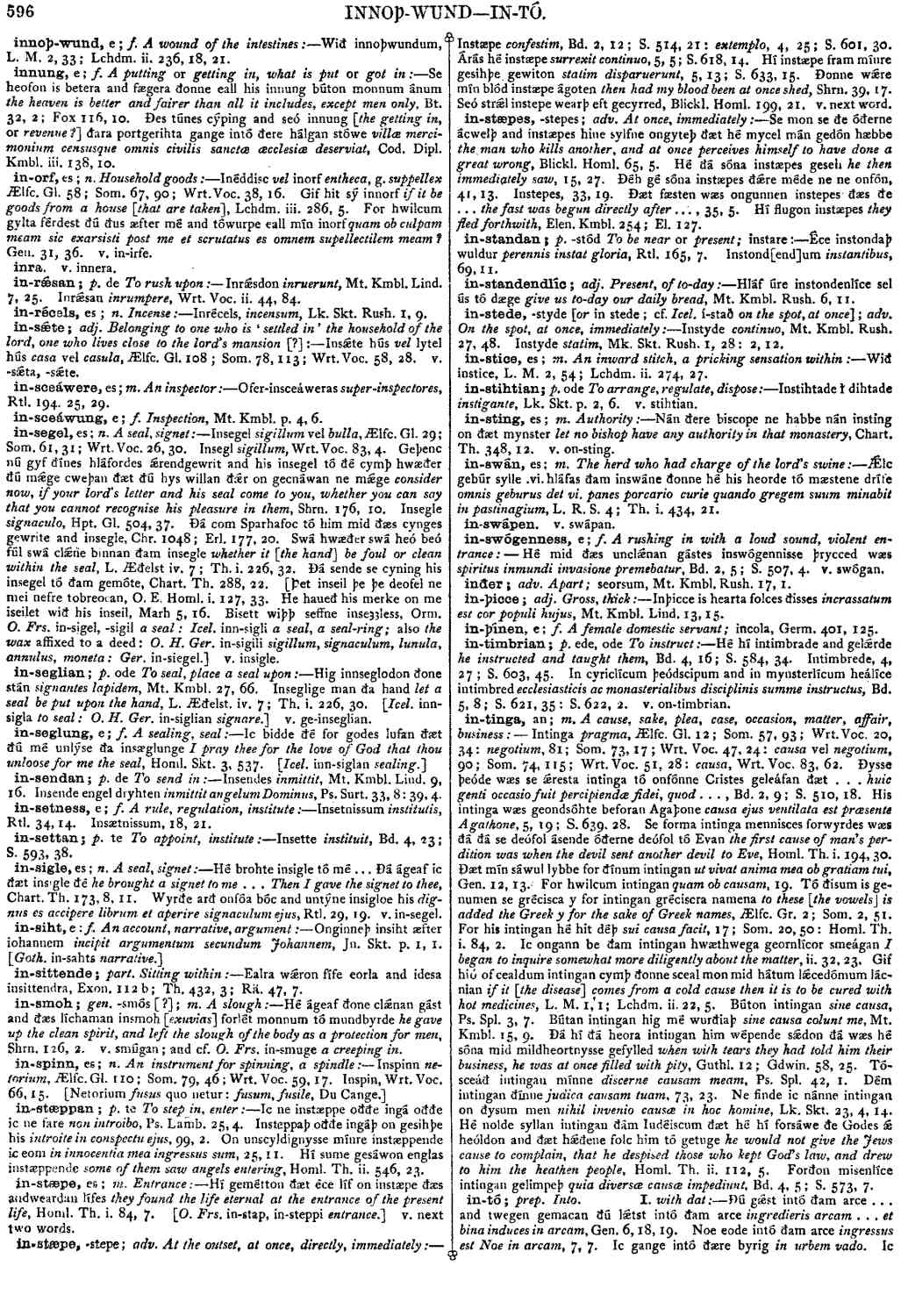in-tinga
- noun [ masculine ]
-
Intinga
pragma,
- Ælfc. Gl. 12 ;
- Som. 57, 93 ;
- Wrt. Voc. 20, 34 :
negotium,
- 81 ;
- Som. 73, 17 ;
- Wrt. Voc. 47, 24 :
causa vel negotium,
- 90 ;
- Som. 74, 115 ;
- Wrt.Voc. 51, 28 :
causa,
- Wrt. Voc. 83, 62 .
-
Ðysse þeóde wæs se ǽresta intinga tó onfónne Cristes geleáfan ðæt . . .
huic genti occasio fuit percipiendæ fidei, quod . . . ;
- Bd. 2, 9 ;
- S. 510, 18.
-
His intinga wæs geondsóhte beforan Agaþone
causa ejus ventilata est præsente Agathone,
- 5, 19 ;
- S. 639, 28 .
-
Se forma intinga mennisces forwyrdes wæs ðá ðá se deófol ásende óðerne deófol tó Evan
the first cause of man's perdition was when the devil sent another devil to Eve,
- Homl. Th. i. 194, 30 .
-
Ðæt mín sáwul lybbe for ðínum intingan
ut vivat anima mea ob gratiam tui,
- Gen. 12, 13.
-
For hwilcum intingan
quam ob causam,
- 19.
-
Tó ðisum is genumen se grécisca y for intingan gréciscra namena
to these [the vowels] is added the Greek y for the sake of Greek names,
- Ælfc. Gr. 2 ;
- Som. 2, 51 .
-
For his intingan hé hit déþ
sui causa facit,
- 17 ;
- Som. 20, 50 :
- Homl. Th. i. 84, 2 .
-
Ic ongann be ðam intingan hwæthwega geornlícor smeágan
I began to inquire somewhat more diligently about the matter,
- ii. 32, 23 .
-
Gif hió of cealdum intingan cymþ ðonne sceal mon mid hátum lǽcedómum lácnian
if it [the disease] comes from a cold cause then it is to be cured with hot medicines,
- L. M. 1, 1 ;
- Lchdm. ii. 22, 5 .
-
Búton intingan
sine causa,
- Ps. Spl. 3, 7 .
-
Bútan intingan hig mé wurðiaþ
sine causa colunt me,
- Mt. Kmbl. 15, 9.
-
Ðá hí ðá heora intingan him wépende sǽdon ðá wæs hé sóna mid mildheortnysse gefylled
when with tears they had told him their business, he was at once filled with pity,
- Guthl. 12 ;
- Gdwin. 58, 25 .
-
Tósceáð intingan mínne
discerne causam meam,
- Ps. Spl. 42, 1 .
-
Dém intingan ðínne
judica causam tuam,
- 73, 23 .
-
Ne finde ic nánne intingan on ðysum men
nihil invenio causæ in hoc homine,
- Lk. Skt. 23, 4, 14 .
-
Hé nolde syllan intingan ðám Iudéiscum ðæt hé hí forsáwe ðe Godes ǽ heóldon and ðæt hǽðene folc him tó getuge
he would not give the Jews cause to complain, that he despised those who kept God's law, and drew to him the heathen people,
- Homl. Th. ii. 112, 5 .
-
Forðon misenlíce intingan gelimpeþ
quia diversæ causæ impediunt,
- Bd. 4, 5 ;
- S. 573, 7.
Bosworth, Joseph. “in-tinga.” In An Anglo-Saxon Dictionary Online, edited by Thomas Northcote Toller, Christ Sean, and Ondřej Tichy. Prague: Faculty of Arts, Charles University, 2014. https://bosworthtoller.com/20697.
Checked: 1